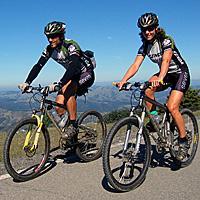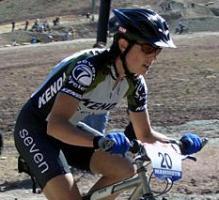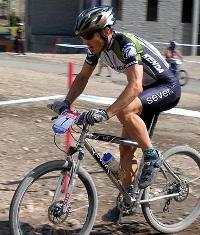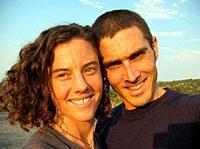
Recently on Cyclingnews.com |
An interview with Mary McConneloug and Mike Broderick, April 27, 2006
Peaceful Warriors
 |
U.S. National Champion Mary McConneloug is a familiar name in the sport of mountain biking. For six seasons, she steadily rose through the sport’s global ranks reaching UCI World Cup podiums and representing her country at multiple World Championships. More famously than that, she also earned the single U.S. women's spot at the Olympics cross-country race in Athens in 2004. McConneloug recently told Cyclingnews MTB Editor Steve Medcroft that she owes all her success to an unusual team structure.
What many people may not know about Mary McConneloug is the off-the-beaten-path way she has managed her career. Instead of signing with a factory team and having handlers and coaches take care of all the details of her day-to-day racing life, she chose the freedom of signing individual sponsorship agreements and taking responsibility for managing every aspect of her career.
That structure is only possible, McConneloug says, because she has a partner; her only teammate, on the road support crewmember and longtime boyfriend Mike Broderick.
Taking off together
Theirs is a symbiotic dependency. Broderick is not McConneloug’s support crew in the traditional sense. Sure, he takes pride in his responsibility to support a world-class female mountain biker, but he is also an elite-level racer in his own right; giving up passion for multiple sports to go on the road with McConneloug more than five years ago.
“I was a serious bike racer but a confused athlete,” Broderick said by phone March. “I had so many sports that I loved. I was a surfer and a snowboarder. I was involved in sports forty hours a week as well as working full time.” He says his hectic lifestyle slowed his development as a mountain biker. “I started racing in 1991 but went up the ranks slowly. I spent something like two years at sport, two years at expert, then two years as a semi-pro before really getting serious.”
Broderick says meeting McConneloug helped him simplify his life. “I was doing too much. My jobs were always physical; landscaping and delivery-driver type work. I would go to races just totally exhausted.”
 |
McConneloug remembers how she met Broderick. “Mike was traveling in northern California, living the vagabond lifestyle, driving around the states in search of surf, snow, and singletrack. I had moved from Bend, Oregon back to Fairfax to live with my Mom. I was focused on preparing for my first full year racing as a “Pro” and working part time as a gardener to support myself."
She met Mike in front of the Fairfax Hardware Store one sunny Tuesday morning in May of 1999. “I was just getting back from a muddy mountain-bike ride and he was standing there in front of his truck preparing for one with some mutual racer friends.” McConneloug stopped by to say hello. She and Broderick rode together the next day. Within two weeks, “my gear was loaded up into his rig and we were on our way down to Big Bear for the first national race of the season.”
McConneloug and Broderick spent several years traveling together around the states camping out of their car/truck/van, splitting the off-season between Broderick’s family home on Martha’s Vineyard in Massachusetts and McConneloug’s family home in Marin, California. Neo-pro McConneloug struggled with sponsorship. “I was getting by with bike frames and credit cards for a while then Jamba Juice picked me and Mike up up in 2000,” McConneloug said. “It was a great experience; my first team where everyone had matching jerseys and some expenses were covered.” But the team sponsorship dried up and the pair was left with an insecure future in the sport.
“Then everything started to fall into place,” Broderick says. McConneloug explained that “we had just sent our resume out to Seven Cycles and they told us to come by. We drove all the way from Big Bear, CA to Watertown, MA (2,922 miles according to Google), where they took our measurements and built us the most incredible custom frames in just four days.” Seven Cycles picked the couple up for sponsorship. “The fact that they accepted Mike and I as a couple was just the coolest thing. That was really the beginning of our true two person team. it just gave us the inspiration and equipment to launch our and careers in the sport.”
For Broderick, the sponsorship meant he could now better devote his time to McConneloug and to racing. “That sponsorship motivated me to be more serious with the bike, to finally let go of everything else and devote my time to our team and really try to focus on being a pro biker,” he said.
Landing in Paradise
 |
The couple’s dedication to the sport, their sponsors and to each other has led to a life of travel; Broderick and McConneloug constantly move between campistes on continents across the world and the comfort and care of friends and family; all the while carefully balancing the responsibilities they have to their sponsors with their basic needs to function as elite-level athletes.
The constant travel and lack of a permanent home means the couple usually extends their season into winter by racing cyclo-cross. In 2005, after five seasons repeating the pattern, the couple decided they needed a complete break, a decision that led them to the island of Hawaii.
“We went to Hawaii because Mike’s brother and his wife were there taking care of a house while getting themselves established and invited us to come stay for a month,” McConneloug said. “We ended up staying two and a half months realizing that it was the perfect place to rest and prepare with base training.
The couple says they focused on recovery and base training in a way they haven’t been able to for years. “This year was different,” says McConneloug. “I was following my intuition that I needed to take a break before it gets too close to the Olympics so we decided to not race cyclo-cross. We needed to see what it was like to really come down from racing and do other things for a while; enjoy some rest, hike, swim, surf and boogie board.”
That took care of November but the lure of trails, allowed them to naturally shift focus come December. “The motivation to get out and ride was incredible – it was something that we just wanted and had to do after a while,” McConneloug says. “We had so many options of where to ride. We could ride through an old growth fern forest to the edge of the jungle and across lava fields with these smoking vents. To have stuff like that, instead of seeing lights and traffic and the city; it changes how you think about things.” McConneloug says the hours of mostly unstructured riding gave her a deeper foundation of fitness than she feels she hasn’t had in years.
As for Broderick, the extra thirty hours a week of surfing he squeezed in has him excited about racing again. “I had a few years of pent up surfing to get out,” he said. “It was irresistible. I’d go out before the sun even came up. It would still be dark and I would be diving into bathtub-warm water. I’d surf for maybe three hours, take a break and eat some food, then ride four or five hours with Mary. I think it actually expanded my cardio beyond whatever I thought possible ”
Did he worry that all the cross training would be too much of a strain on a system he needed to prepare for mountain biking? “No,” he says. “As far as fitness goes, it’s amazing how well the benefits from surfing go hand in hand with cycling. My core totally tightened up; the work completely changed my body in three months. Probably not in the best cycling way but I think the strength I gained will hold by me in the cycling season.”
Drifting back to earth
Being in off-season mode in an exotic location doesn’t mean the couple didn’t have teamwork to attend to. “We couldn’t cut ourselves off completely,” McConneloug says. “We had to spend quite a bit of time negotiating contracts; deciding which companies we’re going to work with, designing clothing and just handling everything that goes into running the team.”
 |
In an industry where racers are constantly competing for sponsorship, McConneloug and Broderick have managed to establish several key long-term relationships with sponsors (Seven and Kenda specifically). “That’s actually the core of our program,” McConneloug says. “We try to develop relationships with companies we truly believe in. And it’s not just about product and money, it’s about the relationships we’ve developed with the people at these companies.”
The focus on direct, personal relationships with their sponsors has earned the couple loyalty in return. “We have a solid relationship with all of our core sponsors and we feel so lucky that everyone who matters will continue on with us for 2006. We really like to work with friends especially when they are at the helm of great companies. Our ultimate goal would be that we continue to work with all of our great sponsors and people for the extent of our careers."
The couple says that the calmer winter has also been an opportunity to design a 2006 season that focuses on maximizing UCI points to help the U.S. gain as many spots as possible at the Beijing Olympics. “We are going to focus on the World Cups, and international races ” Broderick says. “That’s where the level of competition is the highest,” McConneloug adds. “Then besides World Cups, we’ll be at Nationals, we’re both hoping to make the U.S. team for Worlds.”
The overall plan, McConneloug clarifies, is designed to keep the couple balanced. “We want to enjoy what we do and not try to do too much. Our experience tells us that we are better off being more efficient and smarter about running our team so we’re picking and choosing the races that really count.”
The first chance McConneloug and Broderick had at real competition was be at the Ultimate Dirt Challenge in Rincon, Puerto Rico, where McConneloug won the women's cross-country and Briderick came second behind Tod Wells. The race was a warmup for the first World Cup in Curacao. The Sea Otter Classic in Monterey, California April 6-9 will be their first and one of the few events on mainland U.S. soil this year. McConneloug says the plan is to use Sea Otter and other early-season races make the transition into race form. We have sixteen or so mountain bike competitions this year. I know I can’t be in top shape for every one so I’m aiming to have my high-end fitness in the middle and tail end of the season.”
“I see myself just growing into racing at this level while balancing my life so I can really enjoy each moment,” she says. “There’s so much that is hard in this sport. It’s hard to train, it’s hard to race, it’s hard to manage our team and everything; I get better at it the more I do it and I want to keep moving in a positive direction, keep improving, keep striving for my potential as a cyclist.”
Broderick has the same organic approach to his ever-growing accomplishments in the sport. “I’m 32 now,” he says. “I really want to go for it over the next few years, do whatever I can to be the best I can be on the bike. Now is the time, not because I feeI like age is a factor but can never be sure when the lure of the waves will become to much to resist."
Keep up with Mike Broderick and Mary McConneloug on their Cyclingews diary.
